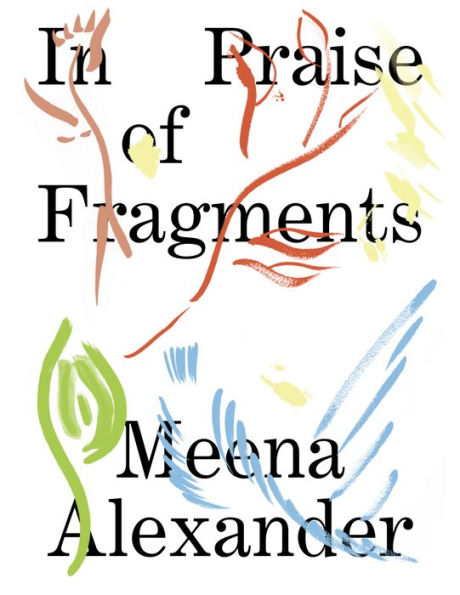The title of Meena Alexander’s posthumous collection, published earlier this year by the always innovative Nightboat Books, pressures its terms to illuminate the complex relationships between action, substance, and shape — the pieces of things that collectively make up one’s life, and what we do with them as substantive material, no matter how incorporeal. It was Goethe who said, “A person places themselves on a level with the things they praise.” But in this book, Alexander places herself directly within the fragments of her life, as they amalgamate on the page and are reconstructed, reconstituted in language.
 In Praise of Fragments is a hybrid compilation that includes Alexander’s own artwork, lyric memoir, an epistolary sequence between the speaker and 17th century Venetian Jewish poet Sarra Copia Sulum, and philosophical musings on the immortality of the soul, the meaning of home, and the ways migration and diaspora dislocate and relocate the self from its past. What kind of praise is Alexander suggesting here? And how does praise function as an action of making rather than a silent, internal activity of commendation? These intriguing and moving sequences provoke this redefining of praise: a thing that requires anthropologic and epistemological work. Alexander said, as noted in the afterword by Leah Souffrant, “The images often make all sorts of tentacles between each other, little roots that they put out, and meanings, they are like synapses, they start to irradiate the structure of the whole.” These hybrid inventions demonstrate the way all of the various fragments of a life include history and require our direct participation in it. The form, its various methods and strategies, is a stay against the limits of language and expression to fully show one’s life.
In Praise of Fragments is a hybrid compilation that includes Alexander’s own artwork, lyric memoir, an epistolary sequence between the speaker and 17th century Venetian Jewish poet Sarra Copia Sulum, and philosophical musings on the immortality of the soul, the meaning of home, and the ways migration and diaspora dislocate and relocate the self from its past. What kind of praise is Alexander suggesting here? And how does praise function as an action of making rather than a silent, internal activity of commendation? These intriguing and moving sequences provoke this redefining of praise: a thing that requires anthropologic and epistemological work. Alexander said, as noted in the afterword by Leah Souffrant, “The images often make all sorts of tentacles between each other, little roots that they put out, and meanings, they are like synapses, they start to irradiate the structure of the whole.” These hybrid inventions demonstrate the way all of the various fragments of a life include history and require our direct participation in it. The form, its various methods and strategies, is a stay against the limits of language and expression to fully show one’s life.
Like Matsuo Basho’s Narrow Road to the Interior, Alexander, too, recounts a journey. This journey requires the fracture of memory, the splicing of form to piece together one’s recollection of the past, their connection to literary ancestors, literal ancestors, and a lifetime of various homes, and, perhaps, various iterations of the souls. “Sometimes I feel I am a shadow with two heads. One head in Manhattan, the other in a childhood place that exists inside me,” she writes. Each movement of this collection exposes this simultaneity: the present place can’t exist without being held up like a negative to the light, which exists as the first concept of place in the child-mind of the speaker. This functions much in the same way one language informs the other in bilingualism. Alexander discusses this experience the third section of the book called “Grandmother’s Garden”:
Ever since I could speak I had two words — amma (mother) and vide (house). When I wanted to say ‘mother’s house,’ referring to the Tiruvella house, I would say ammede vide.
But the word I have now is different. It has heft — old silk rubbed against the palm, scent of fresh frangipani, burnt grass. That’s how it is with language you are estranged from: it flows in dreams, and from time to time you stop into a pool of words utterly old and unutterably new.
What Alexander doesn’t say directly, but that becomes clear in this thinking, is that the very acknowledgment of language’s erasures is a result of a present-self’s past-tense reckoning with it. “A notebook is not a foreign country,” she says in a poem that expresses a fascination, perhaps even envy of Basho who, “burnt his house / And crossed a mountain pass / He entered a kingdom of ringing syllables / And did not lose his way.” Alexander’s life, her movements through place and time, languages, and poetic philosophy both estrange her and create those synapses that structure fragments into a whole. It’s the hybrid nature of this book and Alexander’s expressions of estrangement that make me redefine, for myself, a journey’s purpose. I see now it has nothing to do with completeness or finishedness, but rather the birth of some new bits of life that would have not been found or ordered otherwise. A journey is the activity of our participation in our own history.
Alexander never directly defines “the fragment” but indirectly announces its functions. “The short lines became a way of making time flow,” she says, and:
The scrim of place holding the fragile present in place so that past would not overwhelm.” How does one identify the fragments of this book and what do they come together to make? This is what I observe:
Fragments of language, of different languages, of meanings fractured through time, emigration, and history, real and imagined: “I watch [Sarra] race from the Ghetto to the edge of Zattere. Stare in. She feels so close.
Fragments of memory, of place, of home and the meaning of home, of mother and grandmother and the lineage of generations of women connected through blood and literature: “She is a bitter crystal that never shatters.”
Fragments of light, “Shadows of the palm” and “Sun cuts rippling knife patterns on the sand.”
 Of sound, “The squabbling songs” of “wild parrots clustered in mango trees,” a gramophone with a large horn, the sound of a grandfather’s voice.
Of sound, “The squabbling songs” of “wild parrots clustered in mango trees,” a gramophone with a large horn, the sound of a grandfather’s voice.
Fragments of grief and grieving: “Why did grandmother have to die, I wanted to ask, but I bit down on my tongue. I gulped hard. A funny sound came from my throat. I felt I had swallowed a bird that couldn’t fly.”
Questions as fragments, unanswered: “I wonder if you know this,” “where and what is home,” “what is the price of the soul,” “Who will remember me?”
Alexander fashions these fragments as willful moments of witness. A “syntax of flesh and stone and root/ Anchoring us to ordinary earth.” This wonderful collection teaches us that the fragment, like language, is full of both limits and possibilities. Just as a life.
Poet, novelist and scholar, Meena Alexander was born in Allahabad, India in 1951. She was the Distinguished Professor of English at the Graduate Center/Hunter College, CUNY. She died in November 2018. Her obituary in The New York Times ends with her assertion: “The poem is an invention that exists in spite of history. Most of the forces in our ordinary lives as we live them now conspire against the making of a poem. There might be some space for the published poem, but not for its creation: No ritualized space is given where one is allowed to sit and brood.”
[Published by Nightboat Books on February 4, 2020, 104 pages, $17.95 paperback]